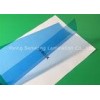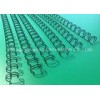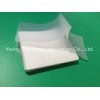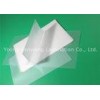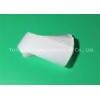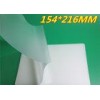Protective Sticky Back Laminating Film A4 , Heat 10 Mil Laminating Sheets
1. Description:
If you need to laminate signs or notices to be displayed on the wall, then these sticky back laminating pouches are just what you need.
You run them through a laminating machine as normal, but instead of stapling or taping them to the wall, you simply peel off the backing and stick them to your desired surface. Both the laminate and the adhesive backing are strong, so you don’t need to worry about them falling off.
This Pouch film is made from a high plastic component that produces a firm, with high gloss quality and also lowers the risk of pouch jamming, used to laminate all kinds of stuff, protecting the precious staff, enhancing the appearance as well.
Technical:
- Rounded corners for safety
- Pouch Size: 216 x 303mm
- Max Insert Size: 210 x 297mm
- Thickness expressed, in microns, as the total of both leaves of film
- Box Quantity: 100
2. Specifications:
| Material | PET+EVA |
| Type | Sticky Back |
|
Laminate Finish |
Gloss |
| Size | A4 Size |
|
Hardness |
Rigid |
| Thickness | 10mil/250micron |
|
Recommended Use |
Documents |
| Packing | Normally 100 pcs/pack,opp bag+white/color box+carton.(or as customers requirements) |

3. Features:
- Protect and enhance sales literature, price lists, notices, menus, teaching aids, photos, work cards and much more.
- Use gloss laminating pouches for maximum clarity and sparkle.
- Matt laminating pouches are best for outside notices and posters where light reflection may be a problem.
- Sticky-back laminating pouches have a self-adhesive backing and can be fixed directly on to notice boards.
4. What thickness laminating pouches should I use?
There are varying thicknesses, ranging from 60 micron up to 250 micron, increasing in thickness as it goes up.
Which one to choose depends on your requirements. The thickness determines the rigidity or stiffness of the laminate, so if you want something that is less likely to bend or fold over, a thicker pouch is better.
Restaurants often use thick laminating pouches for their menus. However, thick pouches are more expensive, so if you’re doing a lot of laminating and want to keep costs down, thinner pouches might be better.
5. Instructions For Use:
- Open the pouch and place the item to be laminated centrally inside the pouch as close to the sealed edge possible.
- Insert the pouch, with the sealed edge first into the laminator at the correct temperature.
- Allow the pouch to cool to the touch before handling it.
6. Why Choose Us:
- Professional Manufacturer
- More Than 15 Years Experience
- OEM/ODM Service.
- Products Exported To Europe, United States ,Southeast Asia, Middle East and other countries and regions.








